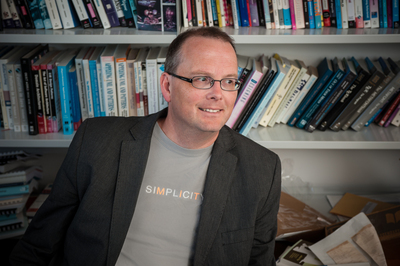How much architecture up front?
22 Jun 2015 - 10:46:55 in Achievement
 Top VUW computer scientists rewarded for pioneering research
A trio of enterprising academics from Victoria University of Wellington's School of Engineering and Computer Science have been recognised and rewarded at the highest level internationally for their ground-breaking research into software development methodology.
Professor of Computer Science James Noble, colleague George Allan and PhD student Michael Waterman received a 'Distinguished Paper Award' at the prestigious International Conference on Software Engineering (ICSE). Michael Waterman completed the research with assistance from a Victoria University PhD scholarship.
Professor James Noble, who himself completed undergraduate, Honours and PhD study in Computer Science at Victoria University, states, “ICSE is the largest and most important academic and research conference on Software Engineering. It is attended by academics, researchers and teachers, but there are also a lot of industrial researchers there. That means there are people from Google, Microsoft, IBM, Facebook and Apple.”
The trio's award-winning paper described alternatives of software development methodologies, including the differences between the dynamic 'Agile' model when compared to the older, more traditional 'waterfall' model.
In the software development process, the Agile model is better equipped to deal with change, while the waterfall method approaches set tasks in a strictly linear fashion. The team's research, which investigated how much architecture should be provided up front in a software design process to maximise customer value, established that there were several optimum approaches.
Professor Noble likens the development of virtual architecture to a real-life analogy: “Traditional software development says, for example, “We want to build a really big building, so we'll dig a really big hole”. The problem is we can't use any of the building until it's built, and even then, because of technological changes and market changes over the years, when it's finished it won't do what we want.
“In some sense, traditionally, you can build software in the same way. With the Agile approach the real issue is how can you get the advantages of being able to build up these projects slowly and also be able to cater to customers as soon as possible? That's important from a financial perspective but also when you start gaining customers they can tell you what you are doing right and what you are doing wrong.”
Professor Noble continues, “So that's the real tension: how do you manage to build a system that in five years is usable, but more importantly, how can we start using it immediately?”
He believes the research will be useful to planners and project managers.
“It's a recognition of the great work we do here at Victoria. When we say that we are a world-class research institution, awards like this show that we are exactly that”.
Top VUW computer scientists rewarded for pioneering research
A trio of enterprising academics from Victoria University of Wellington's School of Engineering and Computer Science have been recognised and rewarded at the highest level internationally for their ground-breaking research into software development methodology.
Professor of Computer Science James Noble, colleague George Allan and PhD student Michael Waterman received a 'Distinguished Paper Award' at the prestigious International Conference on Software Engineering (ICSE). Michael Waterman completed the research with assistance from a Victoria University PhD scholarship.
Professor James Noble, who himself completed undergraduate, Honours and PhD study in Computer Science at Victoria University, states, “ICSE is the largest and most important academic and research conference on Software Engineering. It is attended by academics, researchers and teachers, but there are also a lot of industrial researchers there. That means there are people from Google, Microsoft, IBM, Facebook and Apple.”
The trio's award-winning paper described alternatives of software development methodologies, including the differences between the dynamic 'Agile' model when compared to the older, more traditional 'waterfall' model.
In the software development process, the Agile model is better equipped to deal with change, while the waterfall method approaches set tasks in a strictly linear fashion. The team's research, which investigated how much architecture should be provided up front in a software design process to maximise customer value, established that there were several optimum approaches.
Professor Noble likens the development of virtual architecture to a real-life analogy: “Traditional software development says, for example, “We want to build a really big building, so we'll dig a really big hole”. The problem is we can't use any of the building until it's built, and even then, because of technological changes and market changes over the years, when it's finished it won't do what we want.
“In some sense, traditionally, you can build software in the same way. With the Agile approach the real issue is how can you get the advantages of being able to build up these projects slowly and also be able to cater to customers as soon as possible? That's important from a financial perspective but also when you start gaining customers they can tell you what you are doing right and what you are doing wrong.”
Professor Noble continues, “So that's the real tension: how do you manage to build a system that in five years is usable, but more importantly, how can we start using it immediately?”
He believes the research will be useful to planners and project managers.
“It's a recognition of the great work we do here at Victoria. When we say that we are a world-class research institution, awards like this show that we are exactly that”.
